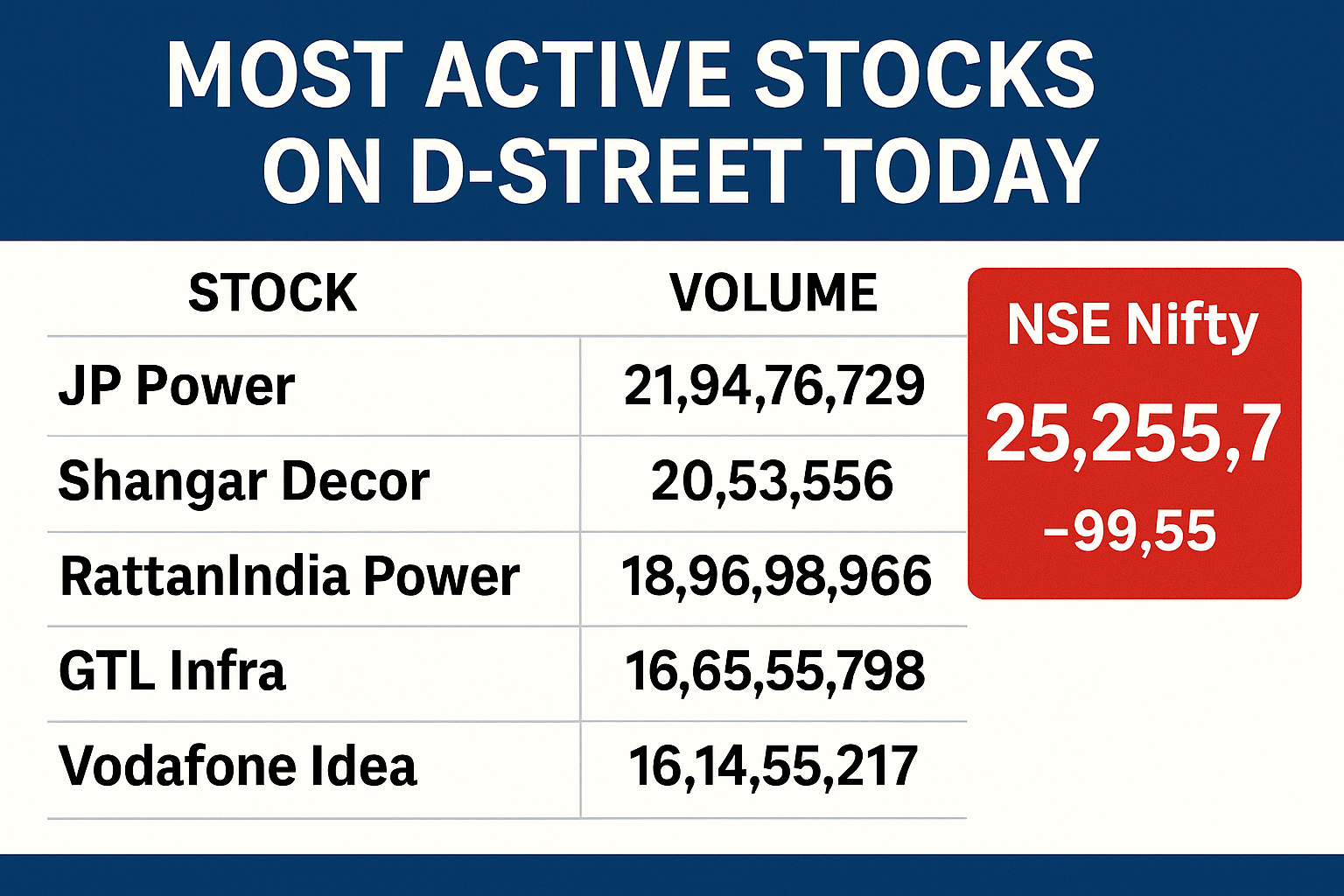
Market Snapshot: NSE Nifty Performance
Today’s trading session on Dalal Street was characterized by significant movements, with the NSE Nifty index closing at 25,255.7, reflecting a decline of 99.55 points. This market snapshot indicates a day of volatility for Indian equities, where investor sentiment and trading activity are crucial determinants of stock performance. The Nifty index has been closely monitored by traders and investors alike, as it is a barometer of market health and investor confidence in India’s economic outlook.
Top Traded Stocks and Their Impact
Amidst the fluctuations in the NSE Nifty, several stocks were identified as the most active on D-Street today, primarily in terms of trading volume. These stocks included well-known market players whose price movements captured the attention of investors. High-volume trading often indicates significant shifts in market sentiment, which can lead to considerable price movements. Active stocks in today’s session may signal possible sector rotations, where investors move their capital depending on market dynamics or other influencing factors.
High trading volumes in specific stocks can occur for various reasons including earnings announcements, regulatory changes, or even investor speculation. Monitoring these active stocks can provide insights into potential trends and shifts in the market that may not be immediately evident.
Factors Influencing Today’s Market Volume
Several factors have influenced today’s high trading volumes on the NSE. One such factor includes macroeconomic data releases that can sway investor sentiment. Additionally, news related to geopolitical events, domestic economic indicators, or changes in policy can sharply affect market movements. Moreover, greater market activity typically occurs when there is increased participation from institutional investors, contributing to volume spikes which might precede significant price movements in either direction.
Furthermore, today’s decline in the NSE Nifty index could partly be attributed to profit booking as many investors seek to capitalize on the market upswings witnessed in previous sessions. This activity is not unusual during periods of high volatility, as investors reassess their positions and make strategic moves to safeguard returns.
Investor Trends and Market Sentiment
Investor trends and market sentiment play a pivotal role in shaping stock market outcomes. As observed today, a mix of fear and uncertainty has led many traders to adjust their portfolios in response to market signals. The significant trading volume indicates a growing interest among both retail and institutional investors, often trying to gauge the best entry and exit points.
The current environment also highlights the importance of understanding sector-specific trends, as certain sectors may perform differently based on economic news and earnings reports. Investors monitoring these trends can better anticipate upcoming shifts in D-Street activity. Overall, the current market sentiment remains cautious, with investors remaining vigilant amidst fluctuating conditions.
What’s Next for Indian Equities?
As we look to the future, the trajectory of Indian equities will depend on a variety of factors, including economic indicators, global market conditions, and corporate earnings reports. Investors should be prepared for continued volatility, particularly if significant developments emerge in the global economy or domestic market policies.
It’s essential for investors to keep a close eye on the Nifty index and understand the implications of shifts in trading volume. By doing so, they can make informed decisions that align with both current market conditions and future predictions. With the Indian economy exhibiting resilience in the face of global headwinds, there might still be many opportunities for growth despite today’s fluctuations.
—
FAQs
Which stocks were most active on D-Street today?
Today, the most active stocks on D-Street included major companies like Reliance Industries, Tata Motors, and HDFC Bank. Their high volumes indicate increased trader interest and could suggest forthcoming trends in their respective sectors.
What factors caused the Nifty index to decline?
The decline in the Nifty index can be attributed to a combination of factors including profit booking, macroeconomic uncertainties, and possibly adverse global cues affecting investor confidence.
How does trading volume impact stock prices?
Trading volume often serves as an indicator of investor interest in a stock. Higher volume usually reflects greater interest and can lead to increased volatility. Consequently, significant volume spikes are often associated with important price movements, either upwards or downwards, as investors react to news or shifts in market sentiment.
—
In conclusion, staying informed about the most active stocks and understanding the factors influencing market volume is crucial for navigating the dynamics of D-Street. By keeping a pulse on these elements, investors can position themselves strategically to leverage opportunities in the ongoing market landscape.
